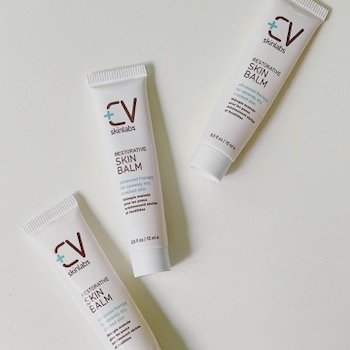
Rosacea vs. eczema: do you know the difference?
It can be confusing. The two skin conditions do have some things in common, but they have differences too.
Whatever the case, if you’re suffering from one or the other—or even both—it can help to know more about them. Then you can target your skincare treatments to help ease your symptoms and enjoy healthier younger-looking skin.
Rosacea vs. Eczema: Are They the Same?
First, let’s talk about what these two conditions have in common.
Both cause similar symptoms, like itchy, red skin, bumps, rashes, dryness, and irritation. These symptoms may come and go, flaring up sometimes and then fading away at other times.
Both conditions are chronic as well. That means that they are long-lasting. You may experience the symptoms again and again for years or even throughout your life.
Because of these similarities, it can sometimes be difficult to determine if you’re suffering from one or the other. But there are clear differences between them.
Rosacea vs. Eczema: What are the Differences?
Let’s look at each of these conditions separately to see the differences.
What is Rosacea?
Rosacea is a chronic skin condition that mainly targets the face. It starts with a tendency to blush or flush easily. Then the redness may slowly spread beyond the nose and cheeks to the forehead and chin. Sometimes, even the ears, chest, and back may be affected.
In addition to the redness, rosacea can also cause the blood vessels in the face to appear more visible, and can sometimes be mistaken for acne. The red skin may feel hot and tender, and over time, the nose may become enlarged.
For the most part, the redness comes and goes with flare-ups, but over time, it can become permanent, particularly in the center of the face.
What is Eczema?
Eczema is another chronic skin condition that makes the skin red and itchy. As opposed to rosacea, which is mostly about redness and swelling, eczema is about dryness and itching. The symptoms vary from person to person but may include dry skin, itching (sometimes severe), red to brownish-gray patches on the skin, bumpy skin that may leak fluid, and thick or scaly skin.
Whereas rosacea mainly targets the face, eczema can appear in different areas of the body at different times. It can affect the cheeks and scalp, particularly in young children, but it can also show up in the creases of the elbows and knees, wrists, neck, ankles, and the crease between the buttocks and legs.
Eczema also comes and goes in flare-ups.
Rosacea vs. Eczema: What Causes Them?
Scientists aren’t sure what causes rosacea, but they believe it could be related to an overactive immune system and may share similarities with autoimmune diseases. (See our post, “Is Rosacea an Autoimmune Disease?”)
Environmental factors and heredity also likely play a role. In most cases, it’s probably a combination of factors that cause people to develop rosacea.
Rosacea flare-ups may be triggered by a variety of things, including hot drinks, spicy foods, temperature extremes, sun and wind, stress, exercise, and even some skincare products.
Eczema—also called atopic dermatitis—is also believed to be caused by a combination of factors. These include allergies, genetics, and environmental factors.
Eczema flare-ups may be triggered by dry skin, irritants (like detergents, fabrics, and chemicals), stress, and allergens.
 Rosacea vs. Eczema: Who’s At Risk?
Rosacea vs. Eczema: Who’s At Risk?
Rosacea seems to be more common in people of European descent, particularly those who have skin that burns easily in the sun. It is also more likely in adults, typically seen in men and women after thirty, though women are diagnosed with it more often. Men often experience more severe cases and are more often affected by a type of rosacea that attacks the nose.
If you have a family history of rosacea, or if you smoke, you are at a higher risk of developing it.
Eczema often starts in early childhood, though it can develop at any age. It’s thought to be mostly an inherited condition, associated with asthma or hay fever. Those with a family history of the condition, or who suffer from these types of allergies, may be more at risk.
A 2017 study found that some people with eczema have a deficiency in a protein called “filaggrin,” which helps keep moisture in the skin while keeping bacteria out.
 Rosacea vs. Eczema: How to Treat Them?
Rosacea vs. Eczema: How to Treat Them?
So far, doctors can’t cure either of these conditions. But we can work on controlling the symptoms. Both require gentle, nourishing skincare treatment.
First, check with your dermatologist. An official diagnosis can give you a clearer understanding of what your skin is going through, and can help you create an effective treatment plan.
There are medications available to treat both conditions. These include creams, ointments, and gels. They help reduce flushing and constrict blood vessels in rosacea, and help control itching and repair the skin in eczema.
There are also oral drugs that may help. Doctors may prescribe antibiotics or acne drugs for more severe cases of rosacea that cause acne-like breakouts. They may also prescribe oral drugs to control inflammation in both conditions. The U.S. Food and Drug Administration (FDA) recently approved a new injectable drug (called Dupixent) that can help treat severe cases of eczema.
If the blood vessels are enlarged and visible, laser therapy can help them appear less visible. There are some potential side effects, like swelling and bruising, but usually, these go away within a few days. Talk to your dermatologist about the benefits and risks.
Rosacea vs. Eczema: How to Manage Them?
There are several self-care practices you can use to help control your symptoms and reduce your flare-ups of both of these conditions.
Identify and Avoid Triggers
Find out what causes your flare-ups and work to avoid those triggers.
Protect Your Skin
Apply sunscreen daily and always protect your skin from damaging UV rays. If you have rosacea, this is especially important, as the sun can trigger a flare-up. Those with eczema, however, may benefit from short periods of unprotected sun exposure.
Moisturize Well!
Both of these conditions lead to dry, irritated skin that needs moisture. Use a product with natural and non-toxic ingredients that helps drive moisture deep into the skin where it can help with symptoms. We recommend our Calming Moisture and Body Repair Lotion, as they both contain anti-itch, hydrating ingredients.
Treat Rough Areas
If you have rough areas of skin that are cracked, dry, and flaky, give them some extra TLC. We recommend our Restorative Skin Balm, the all-natural healing bond and steroid-free ointment. It provides a seal of moisture over the rough area and can help soften and soothe the skin. Great for using overnight!
Be Gentle
If you have either of these skin conditions, your skin naturally qualifies as sensitive skin. That means it’s important not to rub or touch your face too much, and to use gentle, natural products. Your cleanser is especially important—make sure it does not contain sulfates and has some moisturizing properties.
Try Natural Ingredients
Aloe vera, calendula, sunflower oil, and other natural skin care products contain a lot of natural anti-inflammatory and protective compounds. (See our post, “12 Natural Solutions for Eczema.”)
Control the Itch
It’s not a good idea to scratch when your skin itches, as that can lead to open sores, infection, and scarring. Control the itch with our CV Skinlabs products, and with cold compresses, oatmeal baths, apple cider vinegar, and soft, gentle clothing fabrics. Our Rescue + Relief Spray has special anti-inflammatory ingredients that can be particularly soothing if you store it in the refrigerator.
Use a Humidifier
If you live in a dry climate, your skin is likely to feel worse. Use a humidifier in your bedroom at night to help keep your skin hydrated and less likely to itch.
How do you tell the difference between rosacea and eczema?

